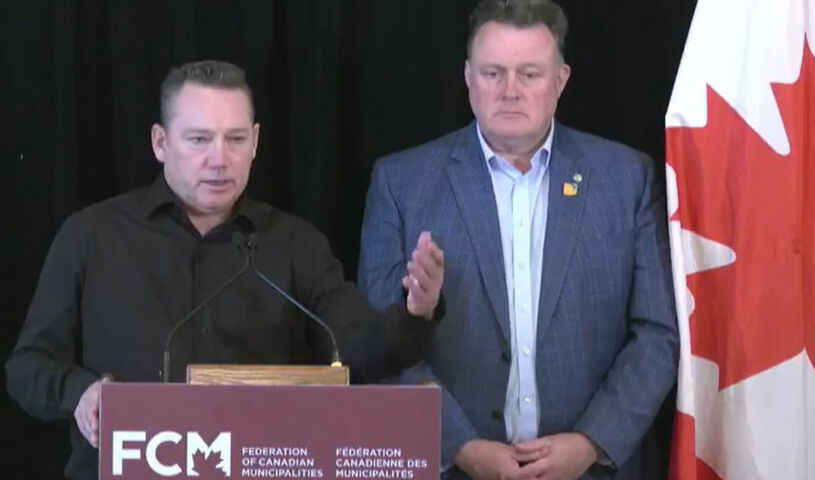Canada’s housing battle is also an infrastructure challenge
 FCM President Scott Pearce (left) and FCM’s Big City Mayors’ Caucus Chair Mike Savage speak with reporters during a media conference, Nov. 23. Photo: FCM Facebook Page
FCM President Scott Pearce (left) and FCM’s Big City Mayors’ Caucus Chair Mike Savage speak with reporters during a media conference, Nov. 23. Photo: FCM Facebook Page
Canada is growing. The population is rising at its fastest rate since the 1950s and is expected to surpass 41 million people next year. Housing affordability and infrastructure renewal are pressing challenges.
The Canada Mortgage and Housing Corporation (CMHC) estimates that by 2030, 5.8 million housing units need to be built. This is 3.5 million more than the projected 2.3 million units based on recent construction rates. However, new homes are only part of the puzzle.
“Municipal infrastructure is a prerequisite to building more housing,” said Scott Pearce, Mayor of Gore, Que. and President of the Federation of Canadian Municipalities (FCM). “We cannot build new housing without putting in place the municipal water, wastewater, transportation and community infrastructure that provides the critical foundation for Canadians’ quality of life.”
FCM commissioned new research that estimates the average cost of municipal infrastructure to support new housing in the country is approximately $107,000 per home. The federal and provincial governments want municipalities to approve 5.8 million homes by 2030. This could result in a $600 billion gap in infrastructure investment.
“Municipalities have limited options to pay for growth,” said Mike Savage, Mayor of Halifax and Chair of FCM’s Big City Mayors’ Caucus (BCMC). “Property taxes and contributions from housing developers, generally known as development charges, are most often the primary sources, and the most stable. Yet the rapid pace of growth, combined with high construction prices due to inflation, means the status quo is no longer keeping up, and the gap is getting wider every day.”
New Municipal Framework
Local governments recognize that increasing taxes and fees on property can increase construction costs. This can impact the business case for developers to start new projects. It also can contribute to upward pressure on housing costs.
Municipalities have no other way to fund needed housing infrastructure. The current framework does not provide any alternative methods.
That’s why FCM is calling on the federal government to convene provincial, territorial, and municipal leaders to discuss a new municipal growth framework. That framework needs to better align municipal revenue with economic and population growth. Such a framework would improve affordability and quality of life for Canadians by enabling municipalities to take action on housing affordability and other pressing challenges, including homelessness and climate change.
The building of those 5.8 million homes is a critical mission and is one Pearce said municipalities take seriously. But he added, Canada must also recognize the other part of the puzzle. The infrastructure needed to turn millions of new houses into thriving communities.
When that $107,000 per house infrastructure investment is multiplied by the 5.8 million housing units, Pearce said it is easy to see why municipalities are sounding the alarm.
“The scale of the investment needed to close that housing gap, the infrastructure, is equivalent to hundreds of billions of dollars. We’re talking today about the significant need because it’s important to understand two things,” Pearce said. “One, the housing challenge is also an infrastructure challenge, one that municipalities are grappling with every day. And two, this underscores a need for new municipal revenue tools that grow as Canada grows.”
Tools to Expand Infrastructure
A move toward a new municipal framework starts with new federal infrastructure investments in the 2024 budget. Since the current round of federal-provincial funding ended last year, FCM has been calling for the next generation of investments.
A baseline commitment on closing the infrastructure gap starts with FCM’s recommendations. The Canada Community-Building Fund will be scaled up. Its annual growth rate will also increase to match economic growth. Pearce said this would give municipalities a much-needed tool to address inflation and renew and expand infrastructure.
In the 2024 budget, the government plans to make new investments. These investments will be used to support growing communities. Ottawa wants to have a national conversation with different orders of government to create a modern framework that meets the needs of these communities.
Savage acknowledged there has been movement on this file with the launch of the Housing Accelerator Fund. The accelerator fund has already led to the signing of funding agreements between the federal government and municipal cities.
FCM and the BCMC have long said that the housing crisis is not something that any single order government can solve. Savaged also acknowledged it will take all orders of government working together along with other partners to solve the problem.
The accelerator fund, he added, is a helpful tool to modernize land use regulations to approve planning and approval processes. It will also serve to upgrade or expand infrastructure to unlock new housing supply.
Municipalities have also shown they’re committed to playing their part in increasing housing supply. Savage emphasized that local governments require crucial but often unseen infrastructure. This is the missing piece to solve the housing crisis and complete the puzzle.
“New housing really depends on this fact. It is essential if we are going to build more homes. That’s why cities have joined FCMs call for a renewed municipal growth framework,” Savage said. “It’s why cities are eager to see the federal government follow through its commitment made in the spring to announce new investments in what we call the next generation of infrastructure as a first step in closing the infrastructure gap.”
Worries About Fiscal Promises
At FCM’s 2023 conference, Prime Minister Justin Trudeau inferred some relief could be expected by the fall. Since then, the focus has shifted to the next federal budget, expected by March or April of 2024.
Pearce said there wasn’t anything for infrastructure in Ottawa’s fall economic statement. This, he was quick to add, was something that disappointed and concerned municipalities across the country.
But while municipalities are concerned, Pearce said they are also hopeful and will continue to work with Ottawa. That expectation, he added, stems from good relationship FCM has with every federal party. It also coincides with the understanding that housing is a crisis in all communities. Pearce said he is hopeful something will come in the 2024 budget.
Savage reiterated that point and said that while not wanting to disparage what the federal government has done to date, more is needed.
“It’s amazing the number of people that move into a new house and expect water to come out of the tap when they turn it on. I mean, this is what has to happen. And they want transit. And they want a green space for their kids to play,” Savage said. “This is infrastructure. It’s infrastructure in the community. And so we’ve had productive discussions. But yes, we want to see movement on the next generation of infrastructure.” MW
✯ Municipal World Executive and Essentials Plus Members: You might also be interested in Sean’s other article: National strategy invests in municipal resiliency.
Sean Meyer is Digital Content Editor for Municipal World.
Related resource materials:



